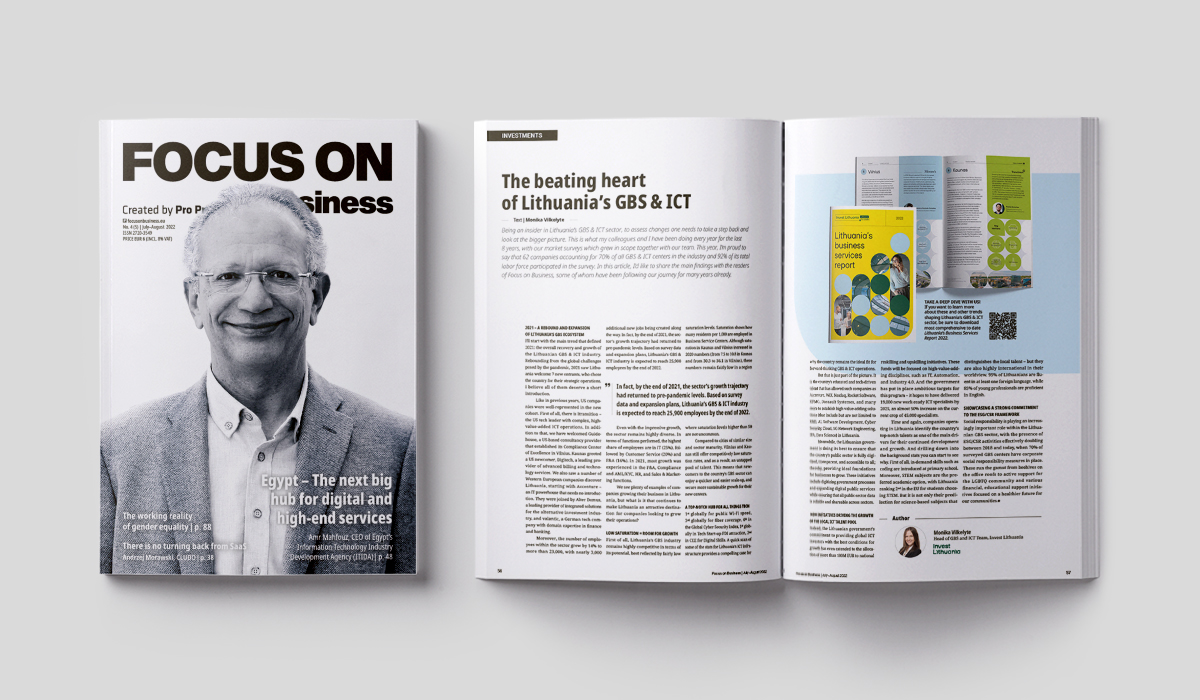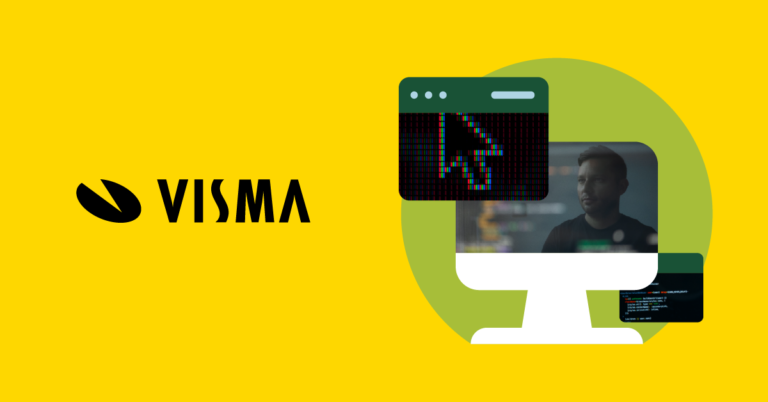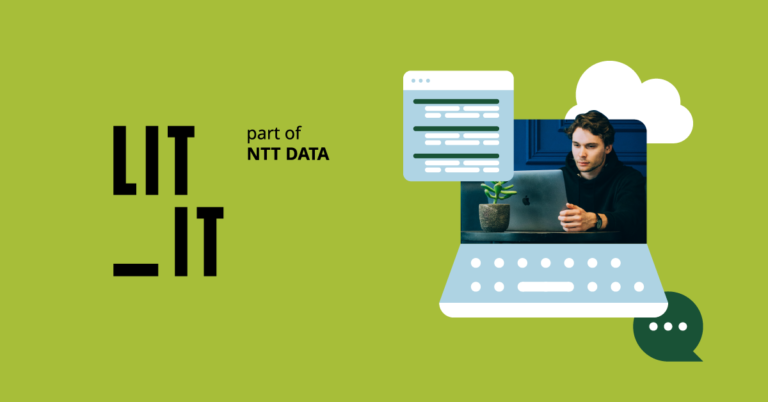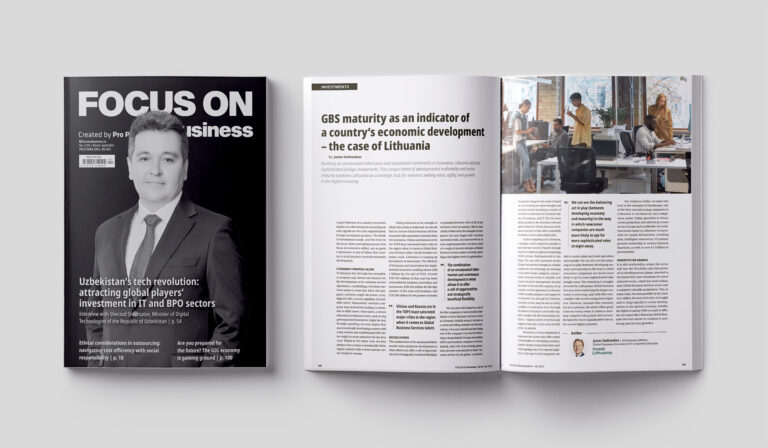This article was originally published on Focus on Business
Author: Monika Vilkelytė, Head of GBS and ICT Team, Invest Lithuania
Being an insider in Lithuania’s GBS & ICT sector, to assess changes one needs to take a step back and look at the bigger picture. This is what my colleagues and I have been doing every year for the last 8 years, with our market surveys which grew in scope together with our team. This year, I’m proud to say that 62 companies accounting for 70% of all GBS & ICT centers in the industry and 92% of its total labor force participated in the survey. In this article, I’d like to share the main findings with the readers of Focus on Business, some of whom have been following our journey for many years already.
2021 – a rebound and expansion of Lithuania’s GBS ecosystem
I’ll start with the main trend that defined 2021: the overall recovery and growth of
the Lithuanian GBS & ICT industry. Rebounding from the global challenges posed by the pandemic, 2021 saw Lithuania welcome 7 new entrants, who chose the country for their strategic operations. I believe all of them deserve a short introduction.
Like in previous years, US companies were well-represented in the new cohort. First of all, there is transition – the US tech leader with complex, high-value-added ICT operations. In addition to that, we have welcomed Guide-house, a US-based consultancy provider that established its Compliance Center of Excellence in Vilnius. Kaunas greeted a US newcomer, Digitech, a leading provider of advanced billing and technology services. We also saw a number of Western European companies discover Lithuania, starting with Accenture – an IT powerhouse that needs no introduction. They were joined by Alter Domus, a leading provider of integrated solutions for the alternative investment industry, and valantic, a German tech company with domain expertise in finance and banking.
Moreover, the number of employees within the sector grew by 14% to more than 23,000, with nearly 3,000 additional new jobs being created along the way. In fact, by the end of 2021, the sector’s growth trajectory had returned to pre-pandemic levels. Based on survey data and expansion plans, Lithuania’s GBS & ICT industry is expected to reach 25,900 employees by the end of 2022.
Even with the impressive growth, the sector remains highly diverse. In terms of functions performed, the highest share of employees are in IT (25%), followed by Customer Service (20%) and F&A (16%). In 2021, most growth was experienced in the F&A, Compliance and AML/KYC, HR, and Sales & Marketing functions.
We see plenty of examples of companies growing their business in Lithuania, but what is it that continues to make Lithuania an attractive destination for companies looking to grow their operations?
Low saturation = room for growth
First of all, Lithuania’s GBS industry remains highly competitive in terms of its potential, best reflected by fairly low saturation levels. Saturation shows how many residents per 1,000 are employed in Business Service Centers. Although saturation in Kaunas and Vilnius increased in 2020 numbers (from 7.5 to 10.8 in Kaunas and from 30.3 to 36.1 in Vilnius), these numbers remain fairly low in a region where saturation levels higher than 50 are not uncommon.
Compared to cities of similar size and sector maturity, Vilnius and Kaunas still offer competitively low saturation rates, and as a result, an untapped pool of talent. This means that newcomers to the country’s GBS sector can enjoy a quicker and easier scale-up, and secure more sustainable growth for their new centers.
A top-notch hub for all things tech
1st globally for public Wi-Fi speed, 3rd globally for fiber coverage, 4th in the Global Cyber Security Index, 1st globally in Tech Start-up FDI attraction, 2nd in CEE for Digital Skills. A quick scan of some of the stats for Lithuania’s ICT infrastructure provides a compelling case for why the country remains the ideal fit for forward-thinking GBS & ICT operations.
But that is just part of the picture. It is the country’s educated and tech-driven talent that has allowed such companies as Accenture, WiX, Nasdaq, Rocket Software, KPMG, Dassault Systemes, and many more to establish high-value-adding solutions (that include but are not limited to R&D, AI, Software Development, Cyber Security, Cloud, 5G Network Engineering, IPA, Data Science) in Lithuania.
Meanwhile, the Lithuanian government is doing its best to ensure that the country’s public sector is fully digitized, transparent, and accessible to all; thereby, providing ideal foundations for businesses to grow. These initiatives include digitizing government processes and expanding digital public services while ensuring that all public-sector data is reliable and shareable across sectors.
New initiatives driving the growth of the local ICT talent pool
Indeed, the Lithuanian government’s commitment to providing global ICT investors with the best conditions for growth has even extended to the allocation of more than 100M EUR to national reskilling and upskilling initiatives. These funds will be focused on high-value-adding disciplines, such as IT, Automation, and Industry 4.0. And the government has put in place ambitious targets for this program – it hopes to have delivered 19,000 new work-ready ICT specialists by 2025, an almost 50% increase on the current crop of 45,000 specialists.
Time and again, companies operating in Lithuania identify the country’s top-notch talents as one of the main drivers for their continued development and growth. And drilling down into the background stats you can start to see why. First of all, in-demand skills such as coding are introduced at primary school. Moreover, STEM subjects are the preferred academic option, with Lithuania ranking 2nd in the EU for students choosing STEM. But it is not only their predilection for science-based subjects that distinguishes the local talent – but they are also highly international in their worldview. 95% of Lithuanians are fluent in at least one foreign language, while 85% of young professionals are proficient in English.
Showcasing a strong commitment to the ESG/CSR framework
Social responsibility is playing an increasingly important role within the Lithuanian GBS sector, with the presence of ESG/CSR activities effectively doubling between 2018 and today, when 70% of surveyed GBS centers have corporate social responsibility measures in place. These run the gamut from beehives on the office roofs to active support for the LGBTQ community and various financial, educational support initiatives focused on a healthier future for our communities.















